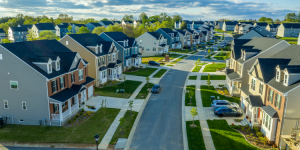
Housing is a significant cost for most expats, affecting their decisions of where to live and whether they should buy or rent. While the global house prices may have increased overall, there are still destinations with attractive home prices for expats. However, not all expats may want to buy homes either, and many factors affect a buy or rent decision.
Housing costs generally make up a large portion of expats' cost of living and can affect relocation decisions altogether.
According to the Global Residential Cities Index by Knight Frank, covering 150 cities, the average house prices increased 7.4% year-on-year to Q1 2021. Izmir (Turkey) topped the list with a whopping 33.9% annual price increase, followed by Ankara (Turkey) with a 30.3% increase and Wellington (New Zealand) with a 30.1% increase. The report stated that 43 cities had over 10% annual price increases to Q1 2021. However, the Knight Frank report noted that “it's not a global boom” with prices decreasing in 22 cities year-on-year. Interestingly, Dubai reported the largest annual price decrease of 4.4% to Q1 2021, with Venice (Italy), Lisbon (Portugal), Kuala Lumpur (Malaysia), Mumbai (India), and Seville (Spain), among the ten cities with the greatest price drops.
How house prices may affect expat relocation
Buying a house is usually a dream of long-term expats or those relocating permanently. Some expats simply don't believe in spending money on rent. However, if home prices are beyond their reach, there may be no choice but to rent in their dream destination or find alternative destinations with affordable housing.
For example, The CoreLogic Home Property Value Index showed that home prices in Sydney (Australia), a desired destination of many expats, increased almost 15% year-on-year to 30 June 2021. Such prices may be unaffordable to many.
With the increase in remote working worldwide, expats after cheaper housing and cost of living can find alternative places to the typical hotspots. They can save money by living in low-cost locations, especially if earning in stronger currencies, which may also allow them to buy a house in a high-cost destination later.
Factors to consider when deciding between buying and renting
Not everyone wishes to own houses, however. Digital nomads, for example, are known to prefer flexible lifestyles. Some countries also have cultures of renting vs others where owning a house is a popular dream.
Buying vs renting is a decision each expat must make based on their circumstances, views of the housing market, and preferences. Expats can consider the below factors, in general, to help with the decision:
- How long you wish to stay
If you plan to live in a place for the long term, buying a home may make sense. For those who don't have long-term plans, renting might be a more flexible and hassle-free option.
- If you are keen to invest in real estate
Some buy their homes as investments. If you believe house prices will rise in the respective location, then buying now might be worth considering, if viable.
Ensure to research the housing market dynamics in your destination and the purchase-process, ahead of making a buying decision. Some countries, for example, have restrictions around non-citizens owning property. Similarly, if you wish to get a mortgage, remember to check all the requirements.
- Is renting cheaper?
In some places, renting can be cheaper than a mortgage. If there is no opportunity to make a significant capital gain later, expats may prefer renting over buying. Make sure to check any other benefits of buying over renting, such as any tax benefits of owning a home in your host country.
- Consider the pros and cons of each option
For example, as a homeowner, you will have an asset that you can profit from if house prices increase and you choose to sell. You can also remodel your house to suit your style within any local rules. However, you will have to incur property costs such as maintenance. Owning also makes the relocation process complex if you must move in a hurry. And whether you make a profit from your home will depend on external market conditions.
Renting, for example, will allow you to have a flexible lifestyle. You can find furnished houses, move easily, and not worry about repairs and maintenance. However, you will not have the flexibility to create your home as you wish. Rent prices can increase, and landlords can ask you to leave within the contractual terms, creating the hassle of house-hunting again.
Unfortunately, in certain locations, both buying and renting a complete home can be unaffordable for some. In such scenarios, expats may wish to consider options such as sharing houses or staying in co-living spaces. These living arrangements can also help save money to buy a home later. Tiny homes and mobile homes are other options growing in popularity.
If owning a home in an expensive city is your dream, then you may have to make some lifestyle changes to afford it. In the alternative, there are other interesting lifestyle options to choose from.



















